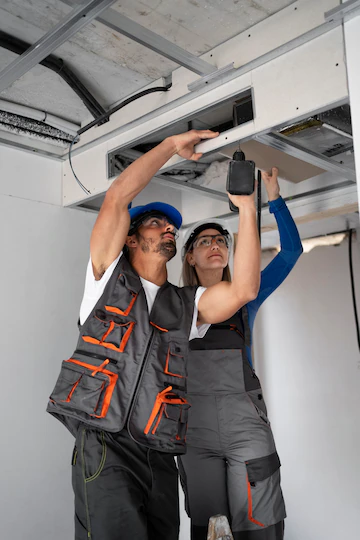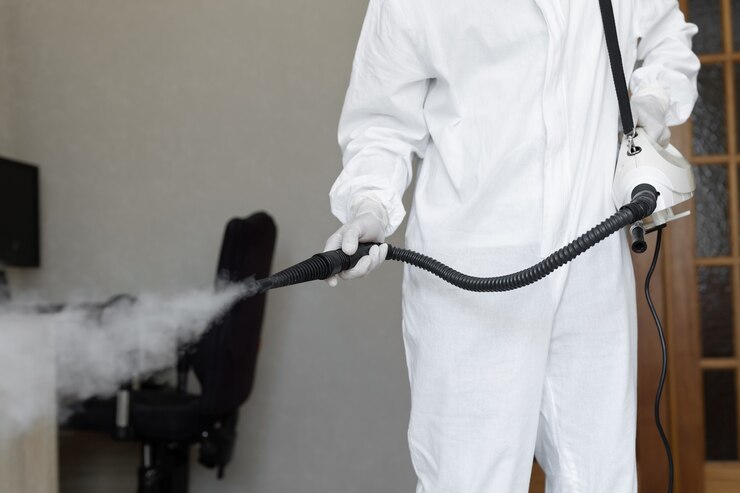How Much Do HVAC Technicians Make?
Determining the earnings of an HVAC technician requires an understanding of various factors that contribute to their salary. HVAC technicians are skilled professionals who specialize in the installation, maintenance, and repair of heating, ventilation, air conditioning, and refrigeration systems. These technicians work in a variety of settings, from residential to commercial, and their compensation can differ based on the complexity of the job, location, level of experience, and education.
Salaries for HVAC technicians vary across different regions of the United States. While some states offer higher paying opportunities, factors such as the local cost of living and demand for HVAC services also play a critical role in determining wages. In addition to their base salary, many HVAC technicians can earn overtime pay, and they may receive benefits such as health insurance, retirement plans, and paid time off, which contribute to their total compensation package.
Key Takeaways
- HVAC technicians’ salaries are influenced by location, experience, and education.
- Additional compensation can significantly increase a technician’s total earnings.
- The job outlook for HVAC technicians is positive, with opportunities for future growth.
What Is an HVAC Technician?
An HVAC technician specializes in the systems that control the climate within buildings. They focus on heating, ventilation, air conditioning, and refrigeration systems to ensure environmental comfort.
What Are the Roles and Responsibilities of an HVAC Technician?
An HVAC technician is tasked with installing, maintaining, and repairing HVAC systems. They work on a variety of equipment including furnaces, air conditioners, and refrigeration systems. It is their job to ensure that these systems are operating efficiently and safely to provide optimal indoor air quality and temperature control.
- Installation: Setting up new systems in residential or commercial buildings
- Maintenance: Performing routine checks and servicing equipment to prevent future issues
- Repair: Diagnosing and fixing problems with existing systems
What Are Certification and Education Requirements for an HVAC Technician?
In order to become a certified HVAC technician, an individual must undergo both education and certification processes. Here is a breakdown of the typical requirements:
- Education: Completion of an HVAC program at a technical school or community college
- Certification: Obtaining industry certifications, which may be mandatory or voluntary depending on the state
| Certification | Description |
|---|---|
| EPA Section 608 | Required for technicians working with refrigerants |
| Industry Organizations | Offer specialized certifications, such as NATE |
Most states require HVAC technicians to hold specific licenses in addition to certifications, ensuring they are qualified to perform work within the field.
Factors Influencing HVAC Technician Salaries
The compensation of HVAC technicians is shaped by several critical factors, each contributing to the potential range of income in the industry.
How Does Experience and Skill Level Affect Earnings?
Experience is a significant factor, with seasoned HVAC technicians often commanding higher salaries due to their advanced skill set and practical knowledge. For example, entry-level HVAC technicians can expect to earn between $31,000 and $46,000 annually, while those with more experience can see that number rise substantially.
What Role Does Geographical Location Play in Salary Variations?
The geographical location of an HVAC technician can profoundly influence their salary. Regions such as the Mid-Atlantic, which includes states like New Jersey, Maryland, and Virginia, offer an average salary range of approximately $40,000 to $60,000 per year, partly due to the cost of living and local demand for services.
How Does Type of Employment Impact Pay?
The type of employment, whether working for a commercial enterprise or providing residential services, can affect a technician’s income. Commercial HVAC work may present different challenges and responsibilities than residentialservices, potentially leading to variance in salaries across these employment types.
In What Way Do Education and Certifications Lead to Salary Differences?
Education and certifications can unlock higher earning potential for HVAC technicians. Those who have invested in their education and obtained relevant certifications tend to be more competitive in the job market, often leading to higher average salaries and opportunities for advancement within the field.
Average Salaries of HVAC Technicians
The compensation of HVAC Technicians varies widely based on location, experience, and certifications. The Bureau of Labor Statistics provides an authoritative perspective on national averages, while resources like ZipRecruiter offer insight into state-specific data.
National Average Salary
According to Indeed, the national average salary for HVAC Technicians in the United States hovers around $28.29 per hour, with the potential for overtime adding significantly to their annual earnings. The Bureau of Labor Statistics, as of May 2020, cites a median pay of $50,590 per year. This median indicates half of HVAC technicians earn more and half earn less.
State-by-State Analysis
When examining HVAC technician salaries on a state-by-state basis, the differences can be substantial. For instance, states like Alaska pay an average of $79,630 per year, positioning it as a top payer. In contrast, Arkansas stands on the lower end of the spectrum with an average annual wage of $41,750. Given the demand for HVAC services varies by state, so does the compensation, reflecting the cost of living and job market conditions within each state.
Top-Paying States for HVAC Technicians
When it comes to the best states for HVAC technician pay, the following five stand out due to higher average salaries. The income in these states is influenced by various factors including local demand for HVAC services, cost of living, and state-specific initiatives focused on sustainability and energy efficiency.
How Does the District of Columbia Rank for HVAC Technician Salaries?
The District of Columbia is noted for its high earning potential for HVAC technicians. In fact, industry statistics have placed it at a top position with an average salary considerably above many states.
What Are the HVAC Technician Pay Scales in Alaska?
Alaska is known for its harsh climate which drives a consistent demand for HVAC professionals. This demand translates into higher wages, with salaries reaching towards the upper earnings spectrum.
Is Connecticut a High-Paying State for HVAC Technicians?
In Connecticut, HVAC technicians benefit from competitive wages that reflect the area’s cost of living and the technical proficiency required in the field. The state offers a robust job market with salaries that are attractive for professionals.
What Do HVAC Technicians Earn in Massachusetts?
Massachusetts sees HVAC technicians receiving salaries that are among the best in the country. The state’s emphasis on energy-efficient systems creates a need for skilled technicians, which in turn pushes wages upward.
How Does Hawaii’s HVAC Technician Salary Compare?
Hawaii presents an interesting case where the high cost of living factors into the compensation, resulting in substantial pay for HVAC professionals compared to other regions. Their earnings reflect the extra technical expertise required to manage the unique challenges presented by the island’s environment.
Note: Other notable states such as New York, California, Illinois, Michigan, Ohio, Pennsylvania, Texas, North Carolina, Georgia, Florida, and New Jersey also offer competitive wages. Conversely, states like Arkansas, West Virginia, Tennessee, Mississippi, and Kentucky typically showcase lower average salaries for HVAC technicians.
Impact of Experience on Earnings
The pay rates for HVAC technicians increase discernibly with experience, reflecting the value of skills and expertise developed over time in the industry.
How Does Experience Affect Entry-Level Positions?
For those just embarking on their HVAC career, entry-level positions typically offer a starting pay that is informed by industry standards but also reflects limited practical experience. An HVAC tech in this category might see average earnings of about $45,340 annually, with variances depending on their location and any foundational certifications obtained.
What Are the Earnings for Mid-Level Experience?
HVAC technicians with mid-level experience, often defined as five to nine years on the job, can expect a significant increase in income. A mid-level experienced HVAC professional usually earns an average of $64,160 per year, demonstrating the value of skills honed over several years of hands-on work.
How Do Senior-Level Technicians Fare in Terms of Salary?
As for senior-level experience, HVAC technicians with many years in the trade can see substantial rewards for their dedication and expertise. Top earners in the field, which often comprises those with the most experience and advanced certifications, can earn upwards of $80,000 annually. This top-tier pay is a testament to the high level of skill and comprehensive knowledge required to operate at such an advanced level in the HVAC industry.
Additional Compensation
Beyond their base salary, HVAC technicians can receive several forms of additional compensation. It is important for individuals considering a career in this field to understand these financial incentives and structures that go beyond hourly wages.
What Constitutes Overtime Pay?
Technicians often receive overtime pay when they work beyond their normal hours. For instance, some companies offer overtime at 1.5 times the regular pay rate, which significantly increases a technician’s earning potential. According to a recent report, the average overtime pay for HVAC technicians can be around $6,750 per year.
Are There Bonuses and Incentives Available?
Bonuses and incentives can form a substantial portion of a HVAC technician’s pay. Technicians may receive bonuses for exceptional performance, achieving targets, or as part of profit-sharing schemes within the company. Details collected indicate that these figures can encompass various types of compensation that are not included in the base salary.
What Benefits and Perks Can Be Expected?
HVAC technicians typically enjoy a range of benefits and perks which include healthcare insurance, retirement plans such as a 401(k), and sometimes even education reimbursement. These benefits can enhance job satisfaction and overall compensation packages. For instance, non-cash benefits like a 401(k) can be a crucial factor in an individual’s long-term financial planning.
Job Outlook and Future Growth
Is There a Growing Demand for HVAC Technicians?
The demand for trained HVAC (Heating, Ventilation, Air Conditioning) technicians is strong and expected to grow. According to the U.S. Bureau of Labor Statistics, employment in this field is projected to increase by 6 percent from 2022 to 2032, which is faster than the average for all occupations.
What Factors Contribute to Job Sustainability?
Technicians in the HVAC industry enjoy a level of job sustainability thanks to the essential nature of heating and cooling systems, especially in residential, commercial, and industrial settings. The push towards energy-efficientsolutions and the aging of existing systems also contribute to ongoing service and retrofitting requirements, ensuring sustained work opportunities.
How Do Energy-efficient Technologies Affect the Industry?
With a global emphasis on sustainability, the market for energy-efficient HVAC systems is expanding. Technicians with knowledge of these modern, eco-friendly technologies will likely face increased job security and opportunities. Regulatory changes and building standards that favor green technology installations further support this trend.
What’s the Job Growth Projection?
The industry anticipates a positive job growth rate in the coming years. As summarized by statistics, the median growth rate for HVAC jobs aligns with—or exceeds—the national average.
To summarize, HVAC technicians can look forward to a robust job market buoyed by factors such as technological advancements in energy efficiency and the inescapable need for climate control solutions.
How Can HVAC Technicians Increase Their Earnings Through Education?
The educational journey for HVAC technicians can significantly impact their salary prospects. Here are key educational paths they may consider:
- Technical School Programs: Many HVAC technicians begin their careers with a diploma or certificate from a technical school. These programs provide comprehensive training on HVAC systems, including installation, maintenance, and repair.
- Associate’s Degrees: Pursuing an associate’s degree in HVAC technology can offer technicians a more in-depth understanding of the field. This not only increases their expertise but may also lead to higher-paying positions.
- Certifications: Earning industry-recognized certifications can be a game-changer. Certifications such as the North American Technician Excellence (NATE) can confirm a technician’s knowledge and skills, making them more competitive. Additional valuable certifications include:
- EPA Section 608 Certification
- HVAC Excellence Certification
- Sheet Metal Worker Certification
- Continuing Education: Staying current with the latest technology and techniques is vital. Technicians may attend workshops, seminars, or continuing education classes to stay ahead of industry advancements.
- Online Courses: Online learning platforms offer flexibility for technicians to gain new skills or brush up on existing ones. They can take courses on specific HVAC topics, emerging technologies, or even business and customer service skills to add value to their role.
In summary, a combination of formal education, continuous learning through certifications, and leveraging online resources can significantly contribute to an HVAC technician’s earning potential.
How Do HVAC Technician Salaries Compare to Other Trades?
When considering a career in the skilled trades, potential earnings are often a deciding factor for many people. HVAC technicians, including both HVAC installers and HVAC controls technicians, often find their salaries compared to similar trades like electricians and plumbers.
Electricians: On average, electricians earn a higher annual salary than HVAC technicians. For instance, in 2022, electricians reported an average salary of $65,280.
Plumbers: The income for plumbers is slightly higher than for HVAC technicians but comparable. The median annual wage for plumbers was $56,330 in May 2020, close to the figures reported for HVAC professionals.
HVAC Technicians: The earnings for an HVAC technician can vary based on the specific role within the field. For example, HVAC controls technicians tend to be on the higher end of the wage scale due to their specialized skills in managing and troubleshooting HVAC control systems. In the U.S., the median annual salary for an HVAC technician was reported at $58,500, with hourly wages ranging from $25 to $31.43.
| Trade | Median Annual Salary (USD) |
|---|---|
| Electrician | 65,280 |
| Plumber | 56,330 |
| HVAC Technician | 58,500 |
These wages reflect a demand for skilled technicians in each field, largely driven by the ongoing need for construction, maintenance, and repair of residential, commercial, and industrial buildings. Skilled trade professionals, including electricians, plumbers, and HVAC technicians, can expect a steady demand for their expertise, which directly influences their earning potential.
Navigating the Job Market
The job market for HVAC technicians is dynamic and diverse, offering a variety of opportunities for skilled professionals. Whether they’re looking to specialize in residential projects or commercial troubleshooting, knowing where to find job opportunities and how to negotiate salaries can give them an edge in the industry.
How Can HVAC Technicians Find Job Opportunities?
To discover new job opportunities, HVAC technicians should tap into industry-specific job boards, online professional networks, and company career pages. They should also attend trade shows and local union meetings, which can provide leads on upcoming projects. Building a strong network by joining professional associations and connecting with peers can often lead to referrals and potential job leads.
- Industry-specific job boards: Explore specialized websites that list HVAC job postings.
- Networking: Attend industry events and engage with professionals on platforms like LinkedIn.
- Company career pages: Regularly check for openings at leading HVAC companies.
What Should HVAC Technicians Know When Negotiating Salaries?
When negotiating salaries, HVAC technicians must be aware of their worth and the prevailing wage trends in their geographical area. Understanding the median pay for HVAC technicians is essential, as is the knowledge of salaries at the top and bottom percentiles. They should confidently communicate their skills, experience, and any specialized certifications they hold. Technicians must also consider the benefits package being offered, which can include health insurance, retirement plans, and paid time off.
- Market research: Know the, state-specific, average salary ranges.
- Communication: Clearly articulate skills and experience during salary discussions.
- Benefits package: Evaluate the entire compensation package, not just the salary figure.
Frequently Asked Questions
When exploring the field of HVAC (Heating, Ventilation, and Air Conditioning), potential earnings are a crucial aspect for technicians at various levels of expertise. Here we address some common inquiries regarding HVAC technician compensation.
What are the typical annual earnings for an HVAC technician?
HVAC technicians have a range of income potential, with average salaries at about $46,900 per year. However, more experienced technicians and those in certain locations may earn more.
What is the average hourly wage for an entry-level HVAC technician?
An individual just starting in the HVAC field can anticipate an hourly wage around $15.10. Entry-level positions serve as the foundation for future earnings growth as experience is gained.
Can an HVAC technician earn a six-figure salary?
Yes, a HVAC technician can earn a six-figure salary, particularly if they are highly experienced or hold a specialized certification. It does require advancing into the top percentages of the trade, with the top 10% earning around $80,000 annually, though exceeding that figure is achievable with factors like overtime or business ownership factored in.
What is the top-end salary for a master HVAC technician?
A master HVAC technician, with years of experience and the highest level of certification, can command high earnings, potentially exceeding an annual salary of $80,000.
What factors contribute to the stress levels of an HVAC technician?
Contributing factors to an HVAC technician’s stress include long hours, demand for on-call service, extreme working conditions, and the physical nature of the job. Complexity of tasks and customer service aspects also play a role.
How does HVAC technician compensation vary by state, such as in Mississippi?
Compensation for HVAC technicians can vary significantly by state due to factors like cost of living, local demand for services, and regional economic conditions. For example, median salaries may differ, and specific data by state can provide insights into these variations.






